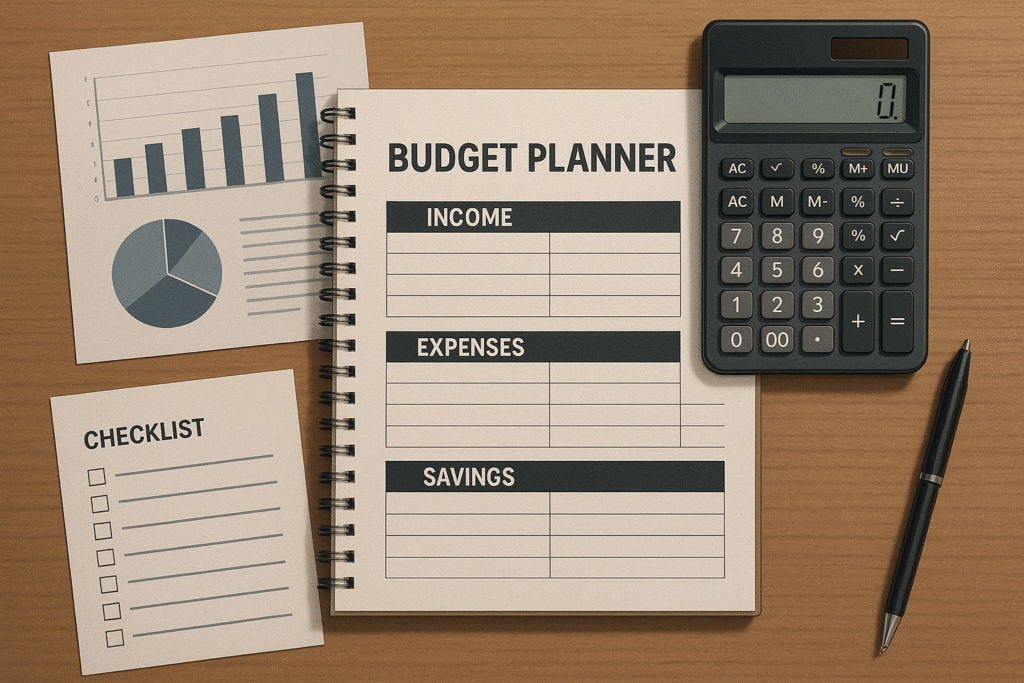Managing money wisely is important for a stable and stress-free life. Personal finance helps you plan, save, and invest your money effectively. Let’s go step by step and understand the basics.
1. Create a Budget
A budget helps you track your income and spending. Write down your earnings and expenses. Set limits on non-essential spending so you can save more.

2. Save for Emergencies
An emergency fund protects you in tough times. Aim to save at least three to six months of expenses. This will help in case of job loss, medical issues, or unexpected costs.
3. Spend Less Than You Earn
Avoid spending more than your income. Overspending leads to debt and financial stress. Stick to your budget and cut unnecessary expenses.
4. Avoid Debt Traps
Use credit wisely. Pay your loans and credit card bills on time. High-interest debt can drain your savings. Try to pay off debts as soon as possible.
5. Invest for the Future
Investing helps your money grow over time. Consider stocks, mutual funds, or real estate. Start early and invest smartly to build wealth.
6. PlanRetirement planning is essential. Contribute to a retirement fund like EPF, PPF, or NPS. The sooner you start, the more secure your future will be.

7. Understand Taxes
Learn how taxes affect your income and savings. Tax planning helps you save money legally. Use tax-saving options like insurance, home loans, and investments.
8. Get Insurance
Insurance protects you from unexpected financial losses. Consider health, life, and property insurance. It ensures peace of mind in emergencies.
9. Increase Your Income
Look for ways to earn more. Develop skills, take side gigs, or invest in education. Higher income means more financial stability.
10. Set Financial Goals
Set short-term and long-term financial goals. Whether buying a house, traveling, or saving for education, planning helps you achieve them.

Final Thoughts
Personal finance is about planning, saving, and investing wisely. Follow these steps to build a secure financial future. Start today, stay consistent, and watch your money grow!
Would you like me to refine any section further?
1. Why is budgeting important in personal finance?
Answer: Budgeting helps you track income and expenses, ensuring you don’t overspend. It allows you to save money and plan for future financial goals.
2. How much should I save for emergencies?
Answer: It’s best to save three to six months of living expenses. This money can help during job loss, medical emergencies, or unexpected financial situations.
3. What happens if I spend more than I earn?
Answer: Overspending leads to debt, financial stress, and difficulty in managing expenses. It’s important to stick to a budget and avoid unnecessary purchases.
4. How can I avoid debt traps?
Answer: Pay loans and credit card bills on time. Avoid high-interest debt and try to clear outstanding balances as soon as possible.
5. Why should I invest my money?
Answer: Investing helps grow your wealth over time. It allows your money to multiply through stocks, mutual funds, or real estate, securing your financial future.
6. When should I start planning for retirement?
Answer: Start as early as possible. The earlier you invest in retirement funds like EPF, PPF, or NPS, the more financial security you will have in later years.
7. How does tax planning help save money?
Answer: Understanding taxes helps you take advantage of deductions and exemptions. Using tax-saving options like insurance, home loans, and investments reduces your tax burden legally.
8. Why is insurance important in personal finance?
Answer: Insurance protects against financial losses in emergencies. Health, life, and property insurance ensure financial stability and peace of mind.
9. How can I increase my income?
Answer: You can earn more by upgrading skills, freelancing, taking side jobs, or investing in education. More income leads to better financial stability.
10. What are financial goals and why are they important?
Answer: Financial goals help you plan for short-term and long-term objectives, such as buying a home, saving for education, or traveling. They provide direction and motivation for saving and investing.


